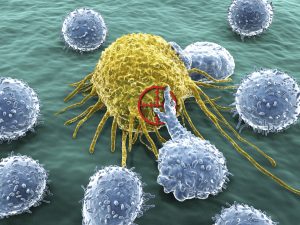Eliminating Donor Variability in ADCC Assays –Implementation in QC Lot Release
Challenges of ADCC Assay Development
Class I therapeutic antibodies achieve their clinical efficacy by binding to their target antigen and through Fragment crystallisable region (Fc) domain-mediated recruitment of immune cell effectors to attack and kill the target cell. Therefore, developers of such therapeutic antibodies must assess all possible Fc-mediated mechanisms of action of their molecules, including Antibody-Dependent Cell-Mediated Cytotoxicity (ADCC). The ADCC assays are one of the most challenging assays to implement for lot release testing. The success of these assays is highly dependent on the quality of immune effector cells, e.g. most commonly used primary human cells, such as peripheral blood mononuclear cells (PBMCs) or natural killer (NK) cells, and often suffer from inherent donor variability resulting in high assay failure rates.

QC Lot Release-Suitability of KILR® CD16 Effector Cells in ADCC Assays
Eurofins DiscoverX introduced single donor-derived immune effector cells, the KILR CD16 Effector Cells, to address these challenges, and these cells can be used in any ADCC assay that directly measures target cell death in a co-culture model. These effector cells are human Cytotoxic T-lymphocytes (CD3+/CD8+) that have been stably transfected with human CD16 receptor (FcγIIIa V158). The cells deliver very low background killing, resulting in robust assay windows with excellent repeatability and precision. The patented manufacturing process ensures consistent assay performance across multiple lots. These cells can be maintained in culture for 14 days with no loss in killing capability, thereby delivering ultimate assay design flexibility. An independent study conducted by a large global CRO using ADCC models for rituximab demonstrated these cells to be a suitable system for QC lot release, and they are now actively recommended to their clients.
Eurofins DiscoverX delivers enabling technologies and the most comprehensive portfolio of established biochemical and cell-based assays, cell lines, reagents, and custom assay development services that accelerate multi-modality drug development programs from discovery to QC lot release. To learn more about KILR cytotoxicity assays, visit our website.
- Blog: Employing KILR® cytotoxicity ready-to-use bioassays from screening to lot release applications
- Case Study: Implementing Robust & Reproducible KILR® Ready-to-Use Bioassays from Screening to Lot Release: Applications for Measuring Direct Cytotoxic Cell Death
- Application Note: Implementing MOA-Reflective ADCC Assays using Ready-to-Use KILR Target and Effector Cells from Screening to Lot Release
